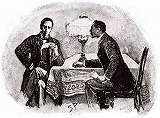“ ‘Nothing. There lies the inexplicable part of it. The message was absurd and trivial. Ah, my God, it is as I feared!’
“As he spoke we came round the curve of the avenue and saw in the fading light that every blind in the house had been drawn down. As we dashed up to the door, my friend’s face convulsed with grief, a gentleman in black emerged from it.
“ ‘When did it happen, doctor?’ asked Trevor.
“ ‘Almost immediately after you left.’
“ ‘Did he recover consciousness?’
“ ‘For an instant before the end.’
“ ‘Any message for me?’
“ ‘Only that the papers were in the back drawer of the Japanese cabinet.’
“My friend ascended with the doctor to the chamber of death, while I remained in the study, turning the whole matter over and over in my head, and feeling as sombre as ever I had done in my life. What was the past of this Trevor, pugilist, traveller, and gold-digger, and how had he placed himself in the power of this acid-faced seaman? Why, too, should he faint at an allusion to the half-effaced initials upon his arm and die of fright when he had a letter from Fordingham? Then I remembered that Fordingham was in Hampshire, and that this Mr. Beddoes, whom the seaman had gone to visit and presumably to blackmail, had also been mentioned as living in Hampshire. The letter, then, might either come from Hudson, the seaman, saying that he had betrayed the guilty secret which appeared to exist, or it might come from Beddoes, warning an old confederate that such a betrayal was imminent. So far it seemed clear enough. But then how could this letter be trivial and grotesque, as described by the son? He must have misread it. If so, it must have been one of those ingenious secret codes which mean one thing while they seem to mean another. I must see this letter. If there was a hidden meaning in it, I was confident that I could pluck it forth. For an hour I sat pondering over it in the gloom, until at last a weeping maid brought in a lamp, and close at her heels came my friend Trevor, pale but composed, with these very papers which lie upon my knee held in his grasp. He sat down opposite to me, drew the lamp to the edge of the table, and handed me a short note scribbled, as you see, upon a single sheet of gray paper. ‘The supply of game for London is going steadily up, it ran. ’ ‘Head-keeper Hudson, we believe, has been now told to receive all orders for fly-paper and for preservation of your hen-pheasant’s life.
“I daresay my face looked as bewildered as yours did just now when first I read this message. Then I reread it very carefully. It was evidently as I had thought, and some secret meaning must lie buried in this strange combination of words. Or could it be that there was a prearranged significance to such phrases as ‘fly-paper’ and ‘hen-pheasant’? Such a meaning would be arbitrary and could not be deduced in any way. And yet I was loath to believe that this was the case, and the presence of the word Hudson seemed to show that the subject of the message was as I had guessed, and that it was from Beddoes rather than the sailor. I tried it backward, but the combination ‘life pheasant’s hen’ was not encouraging. Then I tried alternate words, but neither ‘the of for’ nor ‘supply game London’ promised to throw any light upon it.

“And then in an instant the key of the riddle was in my hands, and I saw that every third word, beginning with the first, would give a message which might well drive old Trevor to despair.
“It was short and terse, the warning, as I now read it to my companion:
“ ‘The game is up. Hudson has told all. Fly for your life.’